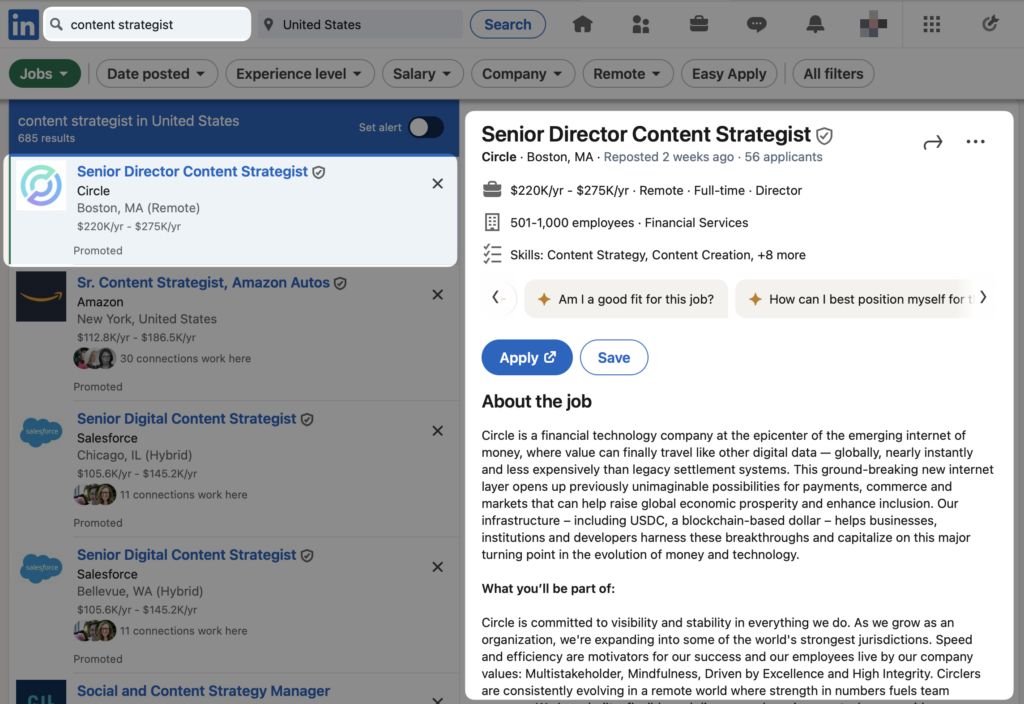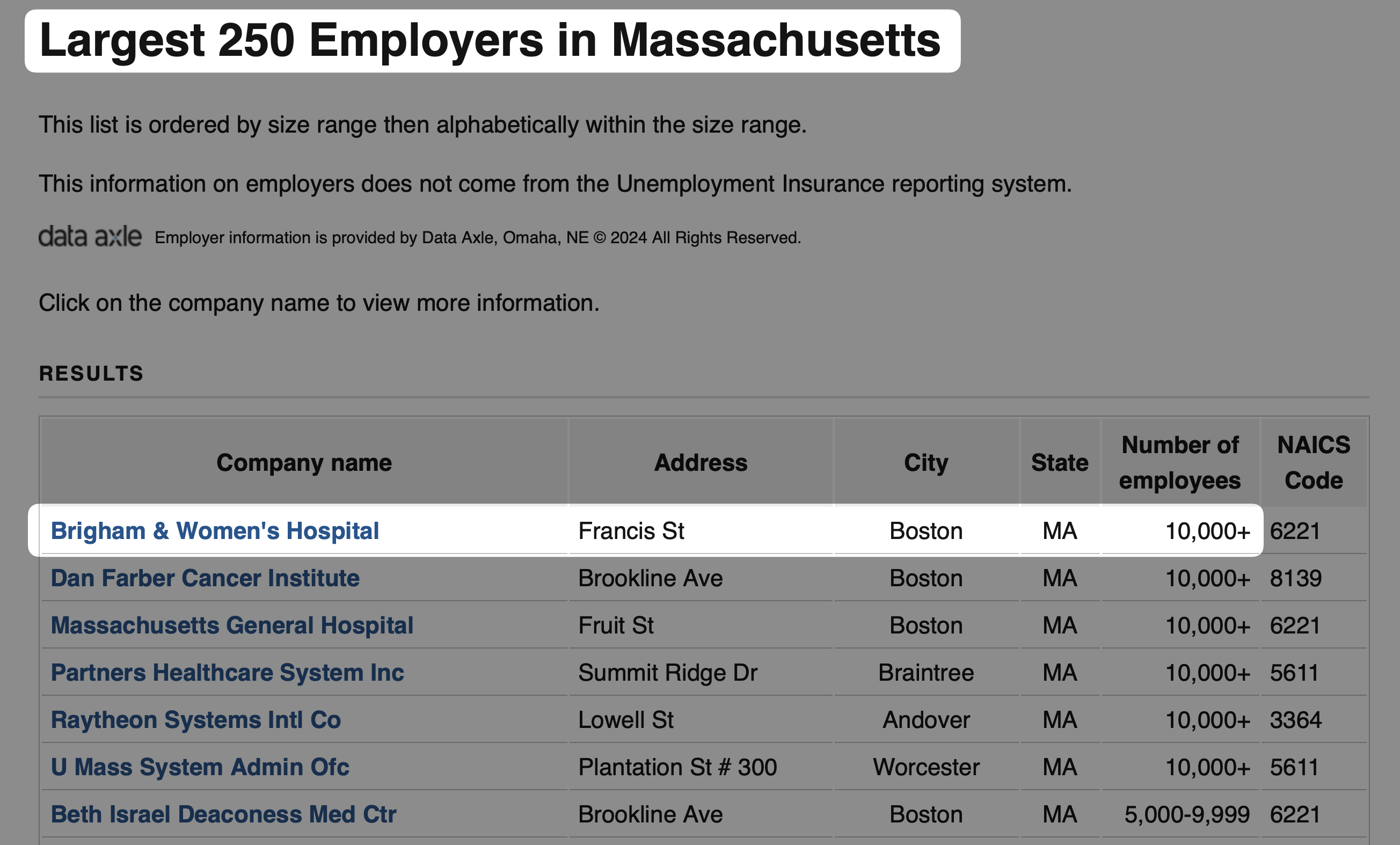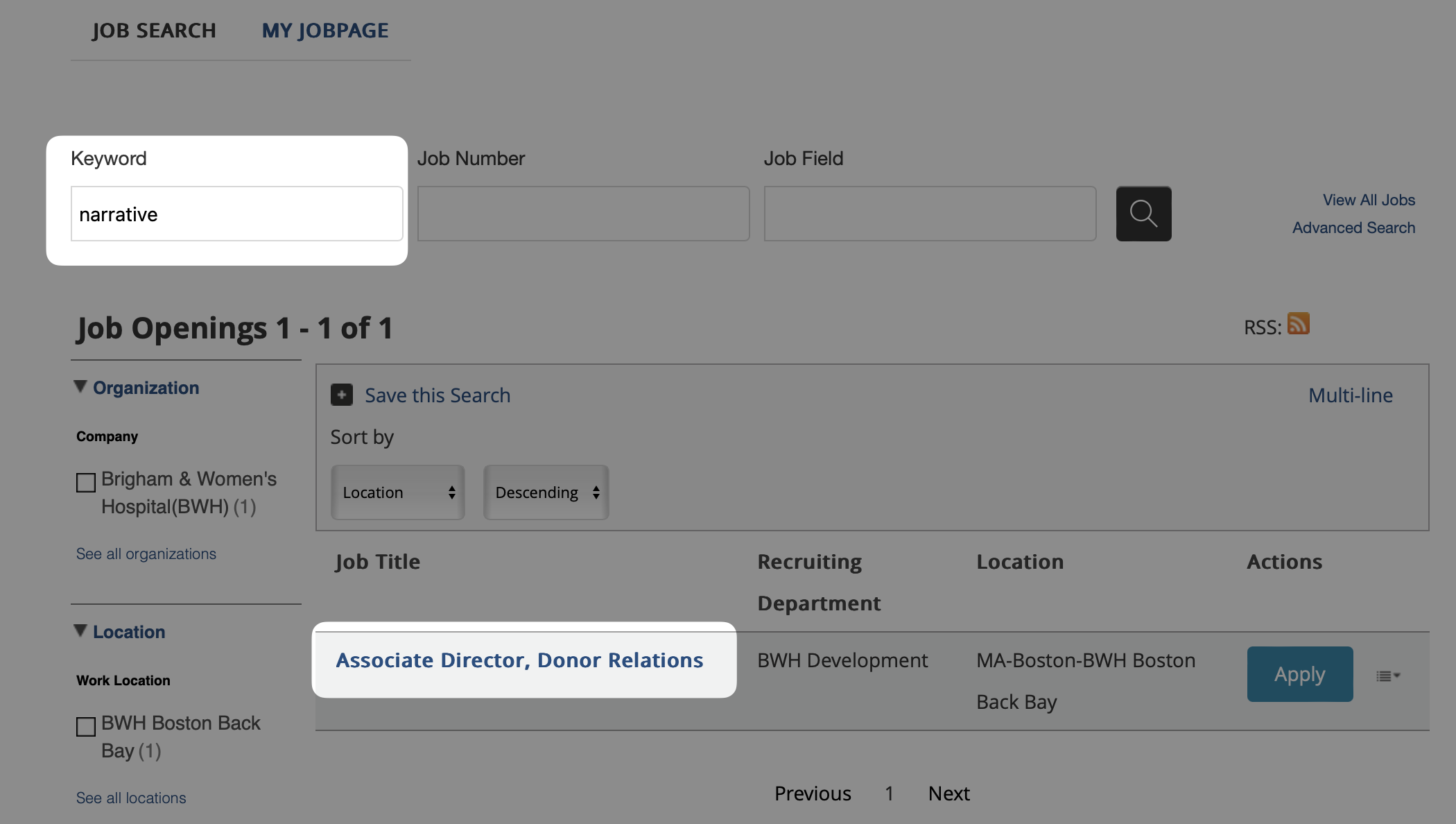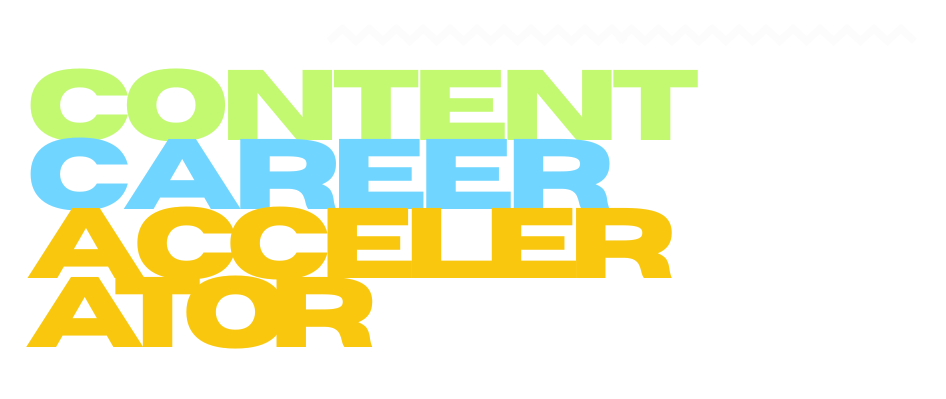Use unique keywords. Get off of LinkedIn. Use your head.
Many job seekers aren’t strategic about their job searching.
Not because they’re not smart. But perhaps because when one is doing work you don’t want to be doing, you find yourself inclined to take shortcuts, make assumptions, and otherwise try to get through it as fast as possible.
This can be especially true for people trying to change careers, who might already be at or nearing burnout or exhaustion. Here’s how it usually goes…
You get frustrated in your current role / career path.
You’re tired of low pay, lack of recognition, the same old problems. Or maybe you’ve been laid off, and it doesn’t seem like it’s going to get any better. So you hunt around, looking for something new.
You have an “a-ha” moment.
You find a talk, book, video, or conference that makes you feel excited again. You dig in further and discover that what you’ve already been doing, or exploring, is a Whole Thing! (Like UX writing, content strategy, information architecture.)
You get overexcited and make quick, disastrous assumptions.
You assume everyone doing work in the exciting new discipline you’ve discovered must all have the same job title — I mean, dentists do dentistry, accountants do accounting, right?
You assume further that job titles align everywhere, and that everyone has a shared understanding of how to apply them.
You assume that there is an established, linear path to getting to do that kind of work full time, and that all you need to do is find where it starts.
You conduct doomed job searches based on bad assumptions.
You use the most obvious title for the work you’re excited about as your search term. You look and look and look for entry-level or junior-level roles with that title. You pop it into LinkedIn’s Jobs search at random times when you are feeling stressed about money or overwhelmed in your current role.
Repeat until burnout.
You find same handful of roles everyone else finds, and apply anyway. You get ghosted.
You do it again. And again. And again…
There’s a better way forward.
That doesn’t have to be your story. You can use your big beautiful creative brain, dig in, and apply smarter tactics as part of a more comprehensive strategy.
Search related roles and title variations.
For starters, add common related roles to your search, and read the JD carefully to see if maybe it’s the right role with the wrong title. For instance, search content designer + UX writer + product writer + product content strategist and so forth on any given day, or careers page, even if you’re primarily interested in true-blue content strategy work. (Job titles rarely align across organizations.)
Build a better keyword list.
Even better — collect words and phrases from job descriptions that interest you, then use those words and phrases as your search terms.
You can build a collection of terms that might help when, for instance, you’re looking for roles on a company’s careers page who might not be hip to trendy job titles for the work you want to do.
Collect phrases in these categories:
- Context keywords — Places or teams where you might be doing the work; e.g. product, CX, monetization, startup, customer success
- Title keywords — Rather than full job titles, try bits and pieces like senior, lead, writer, strategist, or content to mix-and-match with terms in the other categories.
- Special keywords — Try words that describe your strengths (e.g. leadership, collaboration), your skills (e.g. journeys, journey mapping), or even whom you want to work with (e.g. designers, engineers, executive committee).
You can build this list by looking closely at just one or two job descriptions that appeal to you. They don’t even have to be a perfect fit — maybe the wrong location, or asking for too much or too little experience. You’re not focused on the specifics, you’re focused on the words, and the way the role is described. You could even ask a tool like ChatGPT to pull out common keywords from a few listings.
Some of these new keywords might get you more noise than signal in a massive database like LinkedIn’s Jobs section. But they can really work a treat when you’re trying to find relevant roles at specific companies, or on more niche or specialized job boards.
To prove it, I’m going to tell you a different story. This one is about You.
A Story About You
You think to yourself, “Isn’t that the title of an excellent episode of Welcome to Nightvale?” That podcast you were obsessed with back in the day, but drifted away from? You think you might start to get back into it now.
You need a new job. You’ve done your share of content strategy work, some technical writing, and lots of website content management, dealing with all kinds of content and media types.
As you have 100 times before, you idly open LinkedIn, click on the ‘Jobs’ tab, and search ‘content strategist’.

The results load. The first listing catches your eye. Wow, a $220,000 salary, you think to yourself. You’re further excited that it’s in Boston, because that is where you live.
You have a brief daydream about making that kind of money. Then you read the job description, and wonder when you’d ever have time to spend it. But the daydream spirals; you picture yourself wearing slightly nicer clothes, sporting a slightly nicer haircut. You’re driving the same car, but it gets washed more often, at the nice car wash.
But then you tell yourself: Self, you have done this a dozen times already. You know this job showed up for everyone searching ‘content strategist’ . You know it’s been posted and reposted, and has gotten tons of applicants. You’re not sure the job even exists, and you’re not sure you’re even qualified for a senior director role.
Meanwhile, thankfully, you’ve kept this article open in another tab. You decide to return to it, to see what it is that you do next.
You learn about smarter approaches to job searching. The bit about a unique keyword list seems doable to you.
You go back to the fancy job listing. While scanning it over once more (perhaps a slightly larger TV), you spot things that aren’t the usual claptrap — words and phrases that strike you as somewhat unique. You write them down:
- website storytelling
- user journey
- narrative structure
- content discovery
- content needs
- Writing UX copy
- Developing content guidelines
- taxonomy
- content ecosystem
You now have new keywords to try in your job search.
You live in the Boston metro, so you open Google and search for top employers in the Boston metro.

You see Brigham & Women’s Hospital at the top of the list. Duh, you think. You knew that. Or wait, isn’t it Mass Gen now? Oh well, you think, let’s check it anyway.
You find their website, then the careers link, then take a moment to parse what ‘External’ and ‘Internal’ applicants mean, and finally arrive at their collection of … oh, no. 973 openings.

That’s a lot to scan through. You decide to use the search function.
You enter ‘content strategist’, as is your habit.
…
But there are no results.

You decide to try something else, something from your new list of keywords. How about … narrative? You search for it.
You get one result: Associate Director, Donor Relations.

You think that that doesn’t sound like a content strategy job.
But you take a closer look anyway, because you trust Scott, and listen to him, and need a job.
As you scan the listing, exciting and familiar phrases jump out at you. As you do so, your first-person thoughts are reflected in the parenthetical, like a conversation you’re having with yourself. It may be a good time to note that you are extremely British.
mission-driven
(Precisely what I’ve been after, innit?)
mastery in gathering and representing content for a number of reporting formats, including paper and PDF, video, web, and live presentation
(Been there, done that, old chap.)
expertise in science writing and translating complicated ideas into accessible prose
(Science always made me feel daft, but I’ve bloody well done my share of technical writing, eh? A right challenge!)
Manage reporting strategy and execution for our most generous donors
(Blimey! Could reporting strategy be a specialized application of content strategy?)
Benchmark peer institutions for creative ways to use electronic and other forms of communication to inform donors about the impact of their philanthropy
(Benchmarking, competitive analysis, all stuff I’m quite adept at, you see.)
maintain a portfolio of other complex narrative reports
(Editorial work, that’s my cup of tea.)
Interview physicians, researchers, and other healthcare professionals
(Jolly good! I fancy more face-to-face time with stakeholders, and a bit of practice with me interviewing skills, wouldn’t that be smashing?)
contribute to the evolution and execution of standards related to Guiding Principles and reporting templates that ensure consistent and efficient stewardship reporting
(A style guide, standards, maybe the beginnings of a content design system, even. That’s a full boot!)
Outstanding written and verbal communication skills
(Tickety-boo! All set there!)
The ability to effectively communicate complex ideas in laypeople’s terms essential
(Plain language writing? I’m ace at that.)
As you sit there sipping your tea, puffing on your pipe, and just generally being British, you have a realization. You realize that you are looking at the listing for a job with a title you’d have never thought to search for, at a top employer in your area, at a mission-driven organization, that you are well qualified for.
You start to feel something you haven’t felt in some time. But the word escapes you. Bope? Yope?
The salary isn’t listed. But certainly they have to be competitive with other hospitals and systems in the metro, you think. And you think further: I’ve been out of work for some time, and a steady paycheck from a large stable employer sounds like the bees knees.
You know you can do salary research, and ask your network for insight. (And you wonder if it might be a good time to become a Content Career Accelerator member, to have a support network and career resources right at hand.)
The qualification that feels like a stretch to you is ‘scientific writing’ experience. But after re-reading that portion, you imagine that they might want someone who can understand scientific and technical things, and translate them into plain language. And that is a skill you can make a case for with your experience.
You decide to apply. You click ‘Apply Online’ and begin the somewhat onerous application process. But you’re comforted by the fact that this one feels like an actual possibility, not a shot in the dark. You’re glad you get the CCA newsletter, and make a note to tell 5 people about it.
As you continue with the application process, you reflect on how this was just one keyword, on just one website, for just one employer in your area. You start to imagine what else you might find if you keep going.
The word comes back to you: Hope.
Keep your head up, and use it.
Believe it or not, that story uses the first keyword I tried at the first employer I checked. It won’t always be so easy, but that’s kind of encouraging, isn’t it? There are possibilities. You can create possibilities. You are smart. You solve problems all day long at work, and in your life. You can be smart(er) about your job search.
Grab some keywords and get creative. You’ve got this, ol’ chap.
